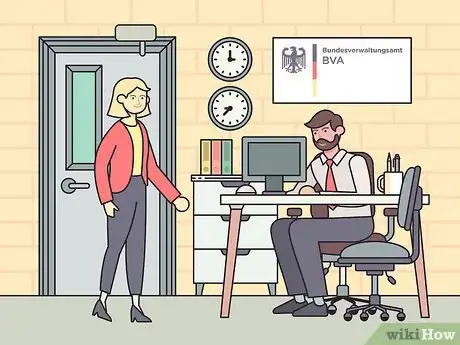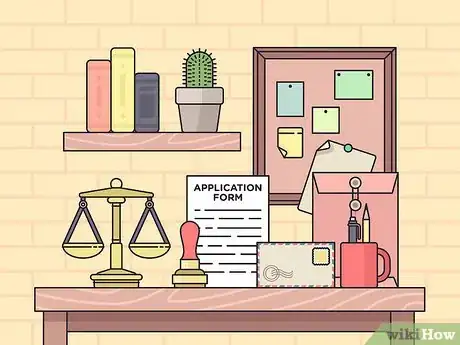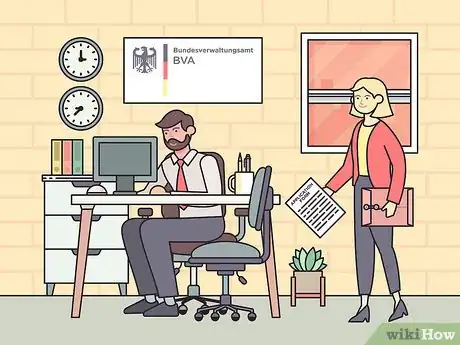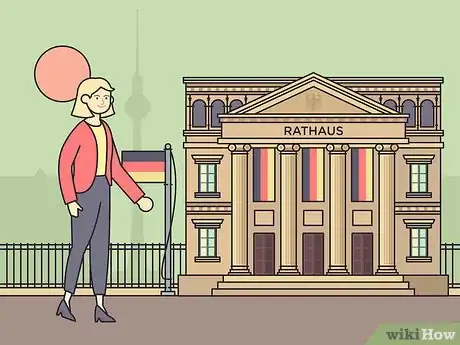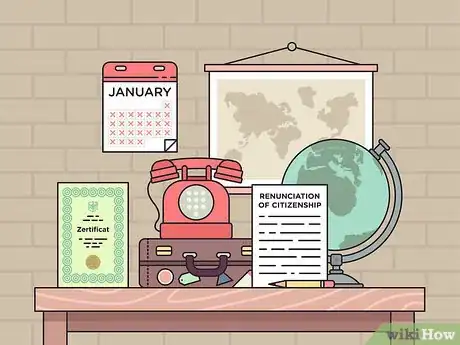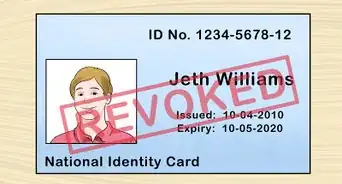This article was co-authored by wikiHow Staff. Our trained team of editors and researchers validate articles for accuracy and comprehensiveness. wikiHow's Content Management Team carefully monitors the work from our editorial staff to ensure that each article is backed by trusted research and meets our high quality standards.
This article has been viewed 23,543 times.
Learn more...
German citizenship gives you the right to vote, move, and work freely in Germany. While German law can be complex, you can make the naturalization process go smoothly by making sure that you have fulfilled all of the requirements first. Apply through your local immigration office or town council. If you are accepted, you will receive a certificate proving that you are a citizen of Germany. It is strongly encouraged that you make an appointment with your local immigration authority to see how the law might apply to you.
Steps
Meeting the Eligibility Requirements
-
1Live in Germany for 8 years. You must have a limited residence visa or a permanent residency visa to live in Germany. Before you become a citizen, you must hold these visas for 8 years. If you are willing to take a German integration course, you only need to live there for 7 years.[1]
- If you have been married to a German citizen for at least 2 years, you only need to have lived in Germany for 3 years before applying for citizenship.
- Refugees and asylum seekers in Germany can seek citizenship 8 years after they have been granted official asylum status and received their residence permit. Time spent in Germany before receiving asylum status generally does not count.
-
2Learn to speak German conversationally. Your German must be at a “B1” level. This means that you can speak and read German well enough to perform basic tasks and to communicate your needs. To prove your language skills, you may either present a “DTZ” certificate from an integration course or take a language exam to receive a Zertifikat Deutsch certificate. A high school or university diploma from a German institution may also work.[2]
- Most language schools and community colleges in Germany offer language courses and exams.
Advertisement -
3Take an integration course to make the process easier. German integration courses are not required, but they can make the process much easier. These courses can reduce the residency requirement by 1 year. They can give you a certificate to prove your language ability.[3]
- You can find integration courses at language schools or German community colleges, known as Volkshochschule.
- You may either take a full language course if you need to learn German or a much shorter culture orientation course if you're already proficient in the language. Language courses usually take 600 hours of instruction while culture orientation courses only take 100 hours.
- At the end of each course, there will be an exam. Once you pass this exam, you will receive a certificate.
-
4Prove your German parentage if you want to apply for citizenship by descent. Only 1 of your parents needs to be German for you to qualify for citizenship via right of blood or Jus Sanguinis. You will need to gather documents proving their German citizenship, such as a birth certificate or a German identification card.[4]
- Children with 1 German parent and 1 parent from the UK, US, EU, or former Soviet Union can apply for dual citizenship. This means that you can be both a citizen of Germany and another country. If you do not have German parents, you cannot get dual citizenship from the US or UK, but you may still be able to get it from the EU or former Soviet countries.
-
5Earn enough money to support your family without welfare benefits. There is no magic number as to how much money you must earn to get German citizenship. The important thing to prove is that you are capable of supporting yourself and any dependents (such as children) without using benefits from the government.[5]
- To prove that you can support yourself, you may provide pay stubs, tax records, or bank statements.
-
6Keep a clean record. To receive citizenship, you cannot have any criminal offenses on your record. A background check will performed on you after you submit your application. If a criminal offense is found, your application may be denied.
-
7Determine if you fall into a special category for immigration. There are a few special circumstances where you may be able to apply for citizenship where you may not have been eligible otherwise. In these situations, talk to a German Federal Office of Administration (BVA) for more information about your situation.
- If you were adopted by a German citizen, you can apply for citizenship through them.
- If your citizenship was revoked by the National Socialist regime (commonly known as the Nazis), you may be eligible to regain your German citizenship. This includes cases where your citizenship may have been denied at birth.
Submitting Your Application
-
1Talk to an adviser at the Federal Office for Migration and Refugees. Each region or land in Germany has their own office. Contact their Citizens’ Advice Service to get personalized information about your application. Application procedures can vary based on your personal history. Advisers can provide answers about the application process or the naturalization test.
- You can call +49 911 943-0 for advice from a migration specialist. This line is operated by the Federal Office for Migration and Refugees. It is open Monday through Friday, 9 am to 3 pm.
-
2Pick up an application form from an immigration office or local authority. Your local authority may include the town or city council, youth migration services, or a local immigration authority office. If you’re uncertain where to get a form, go to your nearest regional advice office or contact a foreign affairs office.[6]
- If you are applying for citizenship while abroad, visit your closest German embassy for more information.
- If you are an adult, you will fill out Form F. Children under 16 should have a legal guardian fill out Form FK.
- If you are applying for German citizenship because you were born to or adopted by a German citizen, you will need to also fill out Appendix V.
- If you are unable to fill out the form yourself, you will need a Vollmacht or power of attorney to allow someone to fill it out for you.
-
3Fill out the application form. The forms will all be in German, and you must fill them out in German as well. Use block capitals to write in the form. Provide your name, age, and current nationality. You will also need to submit information regarding your German identity cards, where you have lived since birth, and any information regarding military service in Germany or other countries.
- If you are applying for German citizenship because 1 parent was a citizen, you will need to submit information regarding their citizenship as well.
- If you are applying for children as dependents, fill out their applications for them.
-
4Gather your documents. You will need to submit proof of your residency, finances, and identity. The documents you need to provide depend on your situation. Talk to an immigration lawyer or adviser from the Federal Office for Migration and Refugees for more information. Some documents you may need include:
- Your most recent German identification card
- Your most recent passport
- Birth certificate or certificate of parentage
- Marriage certificates (if you are married)
- Family registers or proof of relationship to a German citizenship (if you are applying for citizenship by descent)
- Adoption papers (if you were adopted by German citizens)
- Proof of financial stability, such as pay stubs, bank statements, or tax records
- Proof of military service in Germany or work as a civil servant (if applicable)
- Proof that you were a citizen stripped of citizenship by the Nazis (if applicable)
- Proof of language proficiency, such as a German university degree, a certificate from a language course, or a certificate from an integration course.
-
5Submit certified copies of your documents. You will need to have a lawyer or government authority make certified copies of these documents. Take the originals to an immigration advice center or law office to have them copied. Uncertified copies will not be accepted.
- If the documents are not in English or German, you must have them translated by a certified translator. The Federal Office for Migration and Refugees can refer you to a certified translator.
-
6Submit the application to your local immigration authorities. Take the application back to your local immigration authority or mail it to the BVA. Your local town or city council or immigration office can give you more information about how to submit your form.
-
7Pay €255 to cover the application fee. This is the cost of the application as of January 2018. If you are also applying for dependent children, you will need to pay an extra €51 for each child under 16. Submit a check with your form to pay this fee.[7]
-
8Take a naturalization test. Contact your local Federal Office for Migration and Refugees to register for a naturalization test. This test will contain 33 questions about the history, culture, laws, and civic duties of Germany. You will have 60 minutes to take the test. You must answer 17 questions correctly. If you fail the test, you may take it again.
- The test is completely in German. As of January 2018, it will cost €25 to take.
- There is a practice test online in German here: http://oet.bamf.de/pls/oetut/
- If you have a degree from a German university or if you are under the age of 16, you do not have to take this test.
Completing the Process
-
1Attend a naturalization ceremony. If your application is accepted, you will receive a letter from the government with instructions on how to complete your process. You will be given a time and place to attend a ceremony for your new citizenship.
- The length of the application process can vary based on your locality. It can take between a few weeks and a few months to get a response.
- At the ceremony, you will be given an oath to swear. This oath states that you will follow the laws and customs of Germany.
-
2Receive a certificate of naturalization. At the naturalization ceremony, you will receive a certificate of naturalization (known in German as a Einbürgerungszusicherung). This is proof that you are now a German citizen.
- If your application was denied, you will receive a negative certificate in the mail. Talk to your local immigration office to see if you are eligible to reapply.
-
3Relinquish your previous nationality. You should make a copy of the naturalization certificate and send it to the consulate of your previous nationality. Your consulate may require you to fill out forms or pay a fee. Contact them for more information.
- The German government has made it clear that they want to allow full dual nationality, but as of November 2021 the bill has not made its way through parliament.
- Do not send the original copy of your naturalization certificate.
- You do not have to do this if you are able to have dual citizenship with the US, UK, EU countries, and former Soviet countries.
- If your previous nationality does not allow you to relinquish your citizenship (as is the case with Syria, Iran, and Morocco), then you do not have to relinquish your citizenship.
-
4Apply for a German identity card and passport. Take your German naturalization certificate with you to your local residence registration office (known as a Einwohnermeldeamt). Follow their instructions to receive both a new identity card and passport. You can now use these documents to prove your citizenship in Germany.[8]
- You may also be asked to bring your old ID and a new passport photo with you when you apply.
- Do this as soon as you receive your naturalization certificate. It will take a few weeks for you to get your new identity card and passport. Applying for these as soon as possible will prevent any problems if you have to prove your citizenship.
References
- ↑ https://www.thelocal.de/20160624/how-to-apply-for-german-citizenship-brexit-eu-referendum-uk
- ↑ https://www.expatica.com/de/visas-and-permits/A-guide-to-German-citizenship-and-permanent-visas_108795.html
- ↑ http://www.make-it-in-germany.com/en/for-qualified-professionals/living/integration-courses
- ↑ http://www.germany-visa.org/german-citizenship/
- ↑ https://www.thelocal.de/20160624/how-to-apply-for-german-citizenship-brexit-eu-referendum-uk
- ↑ https://www.expatica.com/de/visas-and-permits/A-guide-to-German-citizenship-and-permanent-visas_108795.html
- ↑ https://www.expatica.com/de/visas-and-permits/A-guide-to-German-citizenship-and-permanent-visas_108795.html
- ↑ http://www.make-it-in-germany.com/en/for-qualified-professionals/visa/living-permanently-in-germany/naturalisation#the-naturalisation-process-what-do-i-have-to-do






